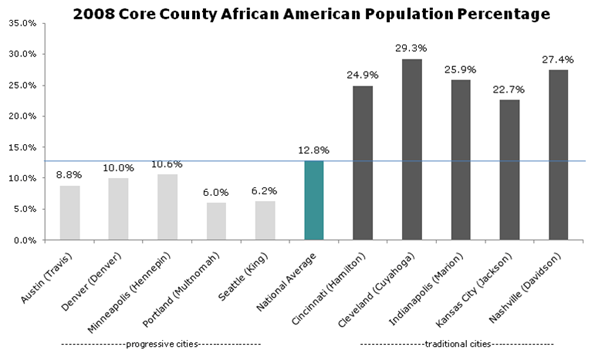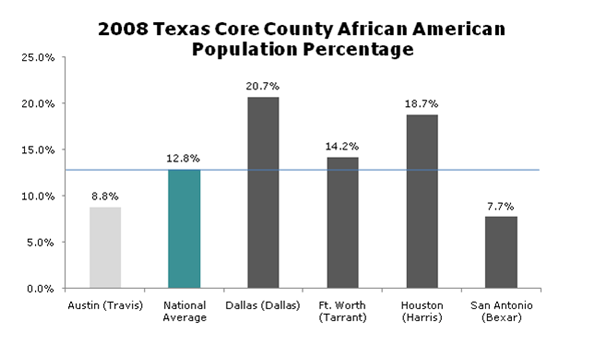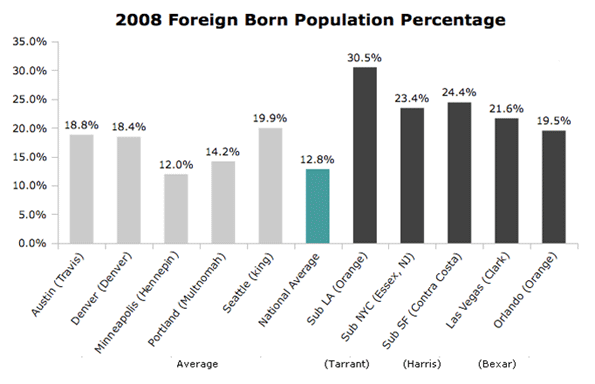
Among the media, academia and within planning circles, there’s a generally standing answer to the question of what cities are the best, the most progressive and best role models for small and mid-sized cities. The standard list includes Portland, Seattle, Austin, Minneapolis, and Denver. In particular, Portland is held up as a paradigm, with its urban growth boundary, extensive transit system, excellent cycling culture, and a pro-density policy. These cities are frequently contrasted with those of the Rust Belt and South, which are found wanting, often even by locals, as “cool” urban places.
But look closely at these exemplars and a curious fact emerges. If you take away the dominant Tier One cities like New York, Chicago and Los Angeles you will find that the “progressive” cities aren’t red or blue, but another color entirely: white.
In fact, not one of these “progressive” cities even reaches the national average for African American percentage population in its core county. Perhaps not progressiveness but whiteness is the defining characteristic of the group.

The progressive paragon of Portland is the whitest on the list, with an African American population less than half the national average. It is America's ultimate White City. The contrast with other, supposedly less advanced cities is stark.
It is not just a regional thing, either. Even look just within the state of Texas, where Austin is held up as a bastion of right thinking urbanism next to sprawlvilles like Dallas-Ft. Worth and Houston.

Again, we see that Austin is far whiter than either Dallas-Ft. Worth or Houston.
This raises troubling questions about these cities. Why is it that progressivism in smaller metros is so often associated with low numbers of African Americans? Can you have a progressive city properly so-called with only a disproportionate handful of African Americans in it? In addition, why has no one called these cities on it?
As the college educated flock to these progressive El Dorados, many factors are cited as reasons: transit systems, density, bike lanes, walkable communities, robust art and cultural scenes. But another way to look at it is simply as White Flight writ large. Why move to the suburbs of your stodgy Midwest city to escape African Americans and get criticized for it when you can move to Portland and actually be praised as progressive, urban and hip? Many of the policies of Portland are not that dissimilar from those of upscale suburbs in their effects. Urban growth boundaries and other mechanisms raise land prices and render housing less affordable exactly the same as large lot zoning and building codes that mandate brick and other expensive materials do. They both contribute to reducing housing affordability for historically disadvantaged communities. Just like the most exclusive suburbs.
This lack of racial diversity helps explain why urban boosters focus increasingly on international immigration as a diversity measure. Minneapolis, Portland and Austin do have more foreign born than African Americans, and do better than Rust Belt cities on that metric, but that's a low hurdle to jump. They lack the diversity of a Miami, Houston, Los Angeles or a host of other unheralded towns from the Texas border to Las Vegas and Orlando. They even have far fewer foreign born residents than many suburban counties of America's major cities.

The relative lack of diversity in places like Portland raises some tough questions the perennially PC urban boosters might not want to answer. For example, how can a city define itself as diverse or progressive while lacking in African Americans, the traditional sine qua non of diversity, and often in immigrants as well?
Imagine a large corporation with a workforce whose African American percentage far lagged its industry peers, sans any apparent concern, and without a credible action plan to remediate it. Would such a corporation be viewed as a progressive firm and employer? The answer is obvious. Yet the same situation in major cities yields a different answer. Curious.
In fact, lack of ethnic diversity may have much to do with what allows these places to be “progressive”. It's easy to have Scandinavian policies if you have Scandinavian demographics. Minneapolis-St. Paul, of course, is notable in its Scandinavian heritage; Seattle and Portland received much of their initial migrants from the northern tier of America, which has always been heavily Germanic and Scandinavian.
In comparison to the great cities of the Rust Belt, the Northeast, California and Texas, these cities have relatively homogenous populations. Lack of diversity in culture makes it far easier to implement “progressive” policies that cater to populations with similar values; much the same can be seen in such celebrated urban model cultures in the Netherlands and Scandinavia. Their relative wealth also leads to a natural adoption of the default strategy of the upscale suburb: the nicest stuff for the people with the most money. It is much more difficult when you have more racially and economically diverse populations with different needs, interests, and desires to reconcile.
In contrast, the starker part of racial history in America has been one of the defining elements of the history of the cities of the Northeast, Midwest, and South. Slavery and Jim Crow led to the Great Migration to the industrial North, which broke the old ethnic machine urban consensus there. Civil rights struggles, fair housing, affirmative action, school integration and busing, riots, red lining, block busting, public housing, the emergence of black political leaders – especially mayors – prompted white flight and the associated disinvestment, leading to the decline of urban schools and neighborhoods.
There's a long, depressing history here.
In Texas, California, and south Florida a somewhat similar, if less stark, pattern has occurred with largely Latino immigration. This can be seen in the evolution of Miami, Los Angeles, and increasingly Houston, San Antonio and Dallas. Just like African-Americans, Latino immigrants also are disproportionately poor and often have different site priorities and sensibilities than upscale whites.
This may explain why most of the smaller cities of the Midwest and South have not proven amenable to replicating the policies of Portland. Most Midwest advocates of, for example, rail transit, have tried to simply transplant the Portland solution to their city without thinking about the local context in terms of system goals and design, and how to sell it. Civic leaders in city after city duly make their pilgrimage to Denver or Portland to check out shiny new transit systems, but the resulting videos of smiling yuppies and happy hipsters are not likely to impress anyone over at the local NAACP or in the barrios.
We are seeing this script played out in Cincinnati presently, where an odd coalition of African Americans and anti-tax Republicans has formed to try to stop a streetcar system. Streetcar advocates imported Portland's solution and arguments to Cincinnati without thinking hard enough to make the case for how it would benefit the whole community.
That's not to let these other cities off the hook. Most of them have let their urban cores decay. Almost without exception, they have done nothing to engage with their African American populations. If people really believe what they say about diversity being a source of strength, why not act like it? I believe that cities that start taking their African American and other minority communities seriously, seeing them as a pillar of civic growth, will reap big dividends and distinguish themselves in the marketplace.
This trail has been blazed not by the “progressive” paragons but by places like Atlanta, Dallas and Houston. Atlanta, long known as one of America's premier African American cities, has boomed to become the capital of the New South. It should come as no surprise that good for African Americans has meant good for whites too. Similarly, Houston took in tens of thousands of mostly poor and overwhelmingly African American refugees from Hurricane Katrina. Houston, a booming metro and emerging world city, rolled out the welcome mat for them – and for Latinos, Asians and other newcomers. They see these people as possessing talent worth having.
This history and resulting political dynamic could not be more different from what happened in Portland and its “progressive” brethren. These cities have never been black, and may never be predominately Latino. Perhaps they cannot be blamed for this but they certainly should not be self-congratulatory about it or feel superior about the urban policies a lack of diversity has enabled.
Aaron M. Renn is an independent writer on urban affairs based in the Midwest. His writings appear at The Urbanophile.













Keith, thank you for sharing
Keith, thank you for sharing that link. And glad to have you as my new BFF!
Social Economics?
As a European I'm much surprised and interested by the discussion taking place here. This is trully a product of the american culture. Nobody in Europe will focus like that on the race's side of things, but will speak about social classes.
It is here admitted that a city, or a neighbourhood, is more progressive than the others when its inhabitants have a higher education and a higher income profile. It can't understand that you don't even take the economics of the so called "white cities" into account.
Instead of putting on trial their said "progressiveness" based on the lack of the most obvious minority, you should ask you why "college educated flock to these progressive El Dorados". The answer is more likely to be: because they have job opportunities there that they don't get in the "black cities".
Race is merelly a byproduct of this since "whites" have more chance to get a good education than blacks. I really think you are missing a point here and I'm quite taken aback that nobody before me pointed this out (or maybe I missed it somehow)
Anyway, what coul (also) be interesting is to see what is the income level and educational background of the minorities in those "progressive cities". Maybe you will find that some have a greater middle class/high class profile than in the other cities.
Anyway being in an historically "white region", it might be normal for Portland to be a bit more "white" than other cities.
dist, your post is
dist, your post is insightful, but I don’t think educated black college kids are moving to cities like Portland and Seattle as much as educated whites, and are instead moving to places like Atlanta and Houston. So my sense is that it’s not just about the educated moving where the jobs are.
Jobs follow "amenities"
Most discussants on this board accept the basic premise that young people choose a location for its lifestyle offerings first, and then they look for a job there. Perhaps in Europe, where mobility is lower, and there are language issues, that's not as true. In the US, it happens all the time.
Also, since most of the black cities are larger and more established than the white cities, they have more pre-existing jobs. In black cities, the college grads apply to one of the big firms. In the white cities, the young people put more effort into creating jobs and businesses because they need to support themselves while they are enjoy their lifestyle.
This is probably the best
This is probably the best comment made so far. Americans are way too wrapped up in black/white issues--to the extent that we define social class as black=(poor and uneducated)or white=(not poor).
It should be becoming more and more obvious (almost blatantly obvious) that education is the element that defines social class. How many african americans with masters degrees live in poor cities? Conversely, how many uneducated blacks live in 'progresive' cities? How many uneducated whites live in poor cities (most would call 'black cities')?
I am almost positive that an educated african american is more likely to 'live where the work is' just as any white american. No point in going college to keep living in poverty--that's the whole point! Education is a huge problem in poor cities, which just happen to be predominately black due to our history--blacks did not make these cities poor. Once educated, many blacks move to whatever city they would like, regardless of demographics. Some stay in poor inner cities to help fight poverty and lack of education, also.
In america we relate EVERY social issue to race---RACE is not what makes people poor or rich. A persons future is largley dependant upon the situation that they are born into. If you are black, you are 'likely' to be born poor (which is why the government assists in educational expenses--it is not my fault that my mother was poor. As a result, I took advantage of federal and state aid, graduated from a top university, am working on my masters, and will soon be a licensed architect).
Anyhow, these studies need to stop focusing on race/ethnicity. Race is not the problem, not the cause of the problem, nor will pointing out race solve anything. And really, who cares if a city is mostly white? Some people like living around white people--some around blacks or asians. So what? If you don't like how Portland does things, don't live there....and don't live in a city that promotes Portlands policies.
It's worth noting that
It's worth noting that hipsters and progressives have flocked to some heavily minority cities like Oakland. Anyway, all big cities with big black populations also have hipsters and progressives, and many of them also have some interesting and innovative urban policies, as you point out. So maybe it's not the progressives and hipsters who are to blame, but the journalists, who hype up certain cities as progressive but ignore the big cities (maybe because they're black, maybe not).
It's legitimate to ask, why are so many of the hip cities you hear about so white? But it doesn't make sense to say, the progressive cities are white, so it must be hypocritical white flight, and progressive policies must only be possible when black people aren't around. You provide zero evidence that either of these things are true. It's sheer speculation and innuendo.
Even though small progressive cities have small black populations, often this population is growing (like here in Madison, Wisconsin), and often there are significant efforts to address urban poverty and social problems. Maybe not often enough, but it happens. In Madison the African-American population is quite poor but their infant mortality rate is the same as whites', far better than in places like Racine or Milwaukee.
governance
I would love to see a comparison of methods of governance in the different cities - it strikes me that homogeneity vs heterogeneity is one thing but progressive ideas need progressive government to flourish. As a New Yorker, it often seems like the thing holding back investments in public transportation is the hamstrung state power structures.
IMHO as a parent, though I would actually rate diversity as being quite important on the "progressiveness scale", because I value raising my son around people who are different than we are.
Crime has not been an issue for us in New York City in about a decade - I worry much more about being hit by a car than by a poor person, to put it bluntly. What matters? Schools and transportation.
Thanks
Thanks for the insightful article. I grew up in Minneapolis, and twenty years ago I spent some time in Houston. I was surprised at how less progressive it was (no alternative newspapers, for example), but also by how many more blacks there were. I preferred Minneapolis. I am exactly the sort of white you are singling out in your article, except that I transcended that nonsense a decade ago at least.
Here are a few extra comments: I had to admit after reading your article and some of the comments that during my period as a progressive, I never thought about what would count as a progressive city from a black point of view. I am also curious about what will happen to Sweden in a couple decades after having admitted so many Muslim immigrants. Finally, some of the blacks in Mpls aren't even African-Americans, but instead are recent immigrants from Africa. That makes Mpls even less like Houston, Detroit, etc.
Definition of "progressive"
It seems to me that the issue is your definition of "progressive". It's lately become a synonym for "homosexual acceptance". I'm not saying this as some kind of anti-gay thing; but when I was in Portland recently, they were practically shouting from the rooftops about how gay-friendly the city was. Marches, centers, discussion groups, meet-and-greets, stuff was all over the place.
And you can see it from the other end, too. One of the things nobody wanted to talk about in California was how Proposition 8 (defining "marriage" as "man plus woman") was very heavily favored by black and hispanic voters.
So when you say that "the most progressive cities are also the whitest", I don't see much of a contradiction there, because the modern definition of "progressive" has little to do with racial inclusiveness. And, to my mind, that's a victory; it means we fought that battle and won it long ago.
Also, exactly right
African Americans are notoriously intolerant of other minorities. I truly don't understand the obsession over this group of people and really don't appreciate their privileging over almost every other progressive ideal.